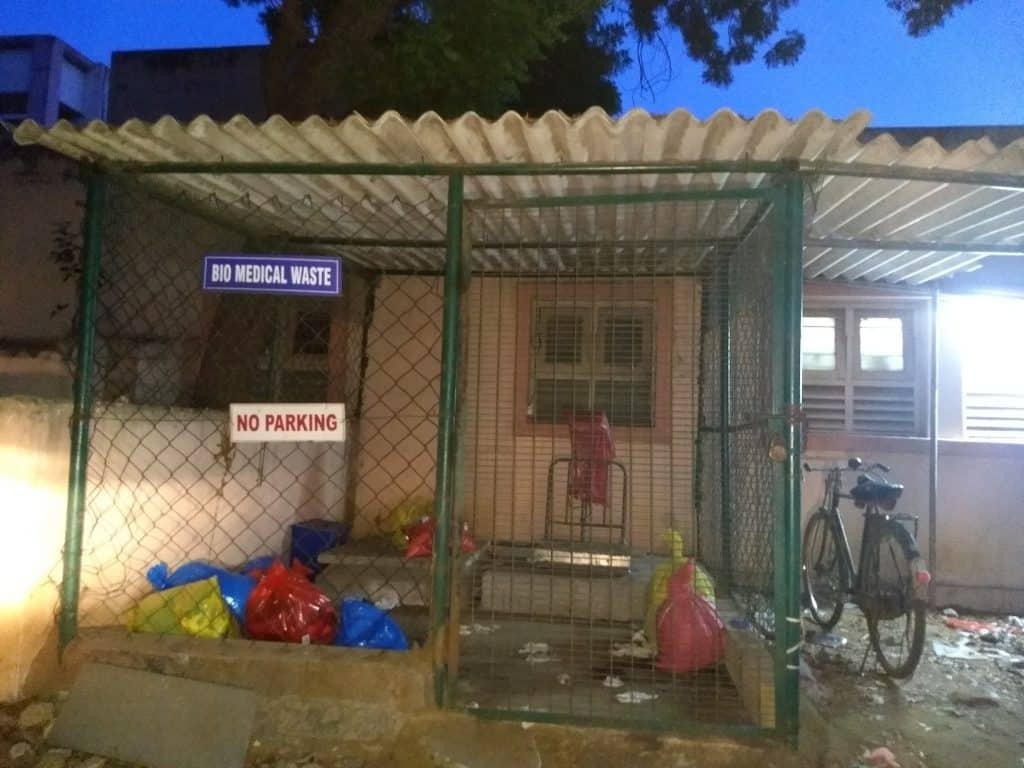Pigs hogging the food waste, a few empty tablet sheets flying around and a muddy road reduced in width to almost half, thanks to the garbage overflowing from three bins — this was the sight that greeted me at the approach to the Voluntary Health Services (VHS) hospital at Taramani on an evening in the second week of April.
The VHS hospital is known for taking health care to the poorer sections of the society, and boasts of various upgraded departments including the neurological department and maternity ward, but on this occasion it certainly appeared that it had a long way to go before it could claim to have a proper garbage disposal system.
Defying Biomedical Waste Rules?
Despite having an exclusive space for bio medical waste management, as per the Biomedical Waste Management Rules, 2016, there were used syringes and tablet sheets witnessed in the garbage dump.
According to Section 4 (c) of the Act, it is the duty of the occupier to “pre-treat the laboratory waste, microbiological waste, blood samples and blood bags through disinfection or sterilisation on-site in the manner as prescribed by the World Health Organisation (WHO) or National AIDs Control Organisation (NACO) guidelines and then sent (send) to the common bio-medical waste treatment facility for final disposal.”
However, the hospital, which claims to segregate the biomedical waste at the ward level does not treat it prior to disposal, as it relies on the private company for the disposal.
When asked about the traces of biomedical waste in the garbage pile on the grounds, authorities said that it was an aberration caused by the lack of awareness by a few workers. “We will soon be setting up CCTV cameras to ensure that biomedical waste is transferred to the space. We have tied up with a private company, who process the waste, as per the rules,” Dr Suresh, honorary secretary of the hospital said. However, he was not aware of the provisions of the BMW act, that mandates pre-treatment of waste.

As per Biomedical Waste Rules, there is a room to store the bio- medical waste at the VHS hospital. Pic: Laasya Shekhar
Corporation rules not followed
The piles of garbage clearly indicated that the solid waste generated in the hospital is not segregated and processed, as per the Solid Waste Management Rules, 2016. It may be noted that Chennai Corporation had mandated all citizens and institutions to segregate the biodegradable and non biodegradable waste, before dumping it in the dustbins. This was evidently not done.
“The stench is so bad that we automatically cover our noses. There is a high probability for the people to fall sick due to it,” said Kumar G, a patient.
However, the hospital management shifts the blame on to the Chennai Corporation officials for poor garbage disposal. “It is the duty of the corporation officials to take away the garbage every day, without us having to inform them. Despite making calls everyday, they refuse to do their job properly, maligning the hospital’s name. The Ministry of Social Welfare, Dr V Saroja, who recently visited the hospital, had also informed the Corporation Commissioner to streamline the procedure,” said Dr Suresh.
Repeated calls to the Corporation Commissioner, D Karthikeyan, went unanswered.